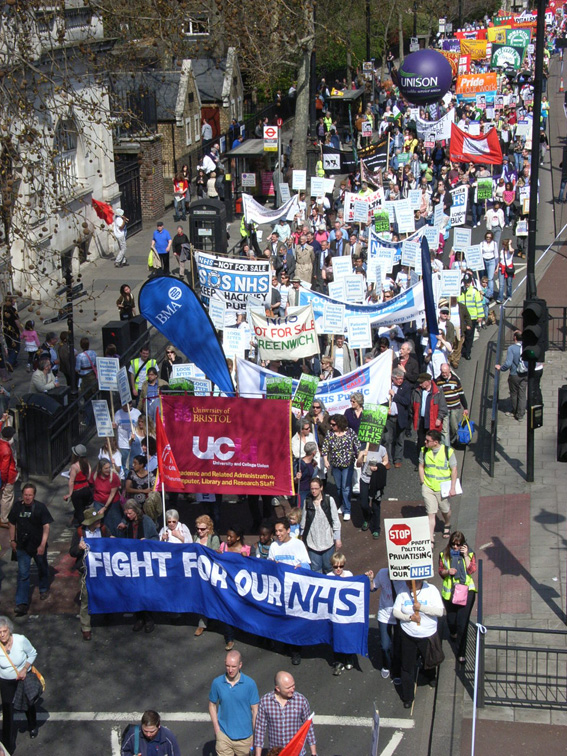UNISON has launched a campaign to save patient transport services in Greater Manchester and stop them from being sold off to a private company.
Last week it was announced that bus privatteer Arriva has been awarded ‘preferred bidder status’ on a three-year contract for non-emergency patient transport in Greater Manchester.
The service provides non-urgent transport to and from hospital appointments for those with real medical needs.
Even though an in-house bid scored better on service quality, Arriva won the contract as the lowest priced option.
Unison is deeply concerned that Arriva will put its drive for profits before the needs of patients – leading to declining service quality that will hit patient care.
Angela Rayner, Unison North West region, said: ‘The privatisation of non-emergency ambulance services in Greater Manchester is wrong and today we are launching a campaign to stop it.
‘This is an important service for people with real medical needs.
‘It is a disgrace that the winning bidder was not the provider with the highest standards, just the lowest cost.
‘We know that privatisation is deeply unpopular with the public.
‘Recent high profile privatisation failings have revealed just how badly things can go wrong – we don’t want patients in Manchester to suffer as a result of this decision.
‘This is the worrying shape of things to come under the Tory health reforms that throw the doors wide open to private companies making a killing from our NHS.’
The launch will take place at 7pm, Monday, 15th October at Manchester Town Hall, with speakers including patients, Andrew Gwynne MP for Denton & Reddish and member of the Shadow Health team, Lucy Powell Parliamentary Candidate for Manchester Central, Angela Rayner Unison Northwest Region.
Recent polling by ComRes for Unison reveals a lack of public trust in private companies providing public services.
The polling reveals a widespread awareness amongst the public that private companies fail to deliver on their contractual obligations and that privatisation leads to lower quality services.
• 62% do not trust private companies to run public services.
• Only one in five (20%) believe that privatisation has led to better quality services to the public, nearly three times as many (55%) believe that public services are of worse quality under privatisation.
•l 81% believe that private companies either frequently or sometimes fail to meet their contractual obligations.
Only last week it was reported that the botched tendering process for the West Coast Mainline would cost the taxpayer between £40 million and £100 million.
It was recently reported that Serco, a private company running out of hours GP services in Cornwall, had given false data to the NHS on 252 occasions.
This followed an inquiry, after fears were raised that the service was so understaffed, it was unsafe – concerns about the service and the effect on the public remain.
Six patients at Lister Hospital suffered irreversible sight loss after they received poor aftercare when they were treated by a private company owned by construction firm Carillion.
Despite failing to deliver on its Olympics contract, G4S boss Nick Buckles has admitted that he expects to be paid its £57 million management fee in full, despite the public sector – the army – stepping in to keep the Olympics safe.
Care home company Southern Cross collapsed in June 2011, leaving the company’s 31,000 vulnerable residents facing huge uncertainty.
The company had been operated by a private equity firm that made money from a complicated sale and leaseback arrangement with its buildings.
In August this year, some workers at private care home Winterbourne View received a prison sentenced after they were caught on camera abusing vulnerable patients. The home has since been closed down.
• Jeremy Hunt’s speech to the Conservative party conference on Tuesday showed that he is ‘out of his depth’ as health secretary, Unite said.
Unite said that Hunt failed to address the crisis in the NHS created by his ‘disastrous’ predecessor Andrew Lansley.
Unite’s head of health Rachael Maskell said: ‘It was evident that Jeremy Hunt has either not got a grip of the scale of the crisis facing the NHS or he is in complete denial – or both.
‘The NHS deserves better than this short, vacuous, policy-light speech.
‘There was no reference to the scale of the cuts currently taking place in England, or to the damage that the so-called £20 billion efficiency savings are doing to the NHS that Jeremy Hunt professes to care for.
‘There was no indication how he would improve the mortality rates for the main “killer diseases” – cancers, strokes and heart disease.
‘If Tory-controlled local councils, which take over the public health budgets in April next year, redirect those budgets away from existing public health services, how is Jeremy Hunt going to improve survival rates for the major “killer” diseases?
‘It is not good for the country; for the NHS and the millions of patients it serves every week that we have a new health secretary so out of his depth, when the waiting lists are rising and thousands of frontline health professionals are losing their jobs.
‘When Jeremy Hunt came into office last month he had a fantastic opportunity to make a name for himself as the health secretary that saved the NHS – he has flunked it at the first hurdle.’
